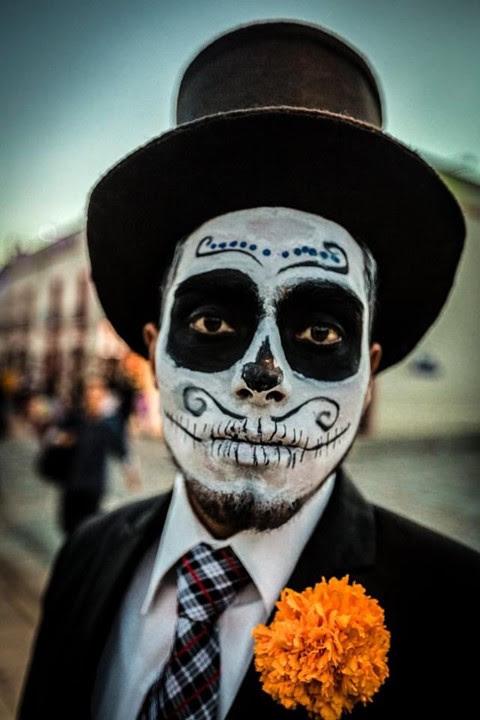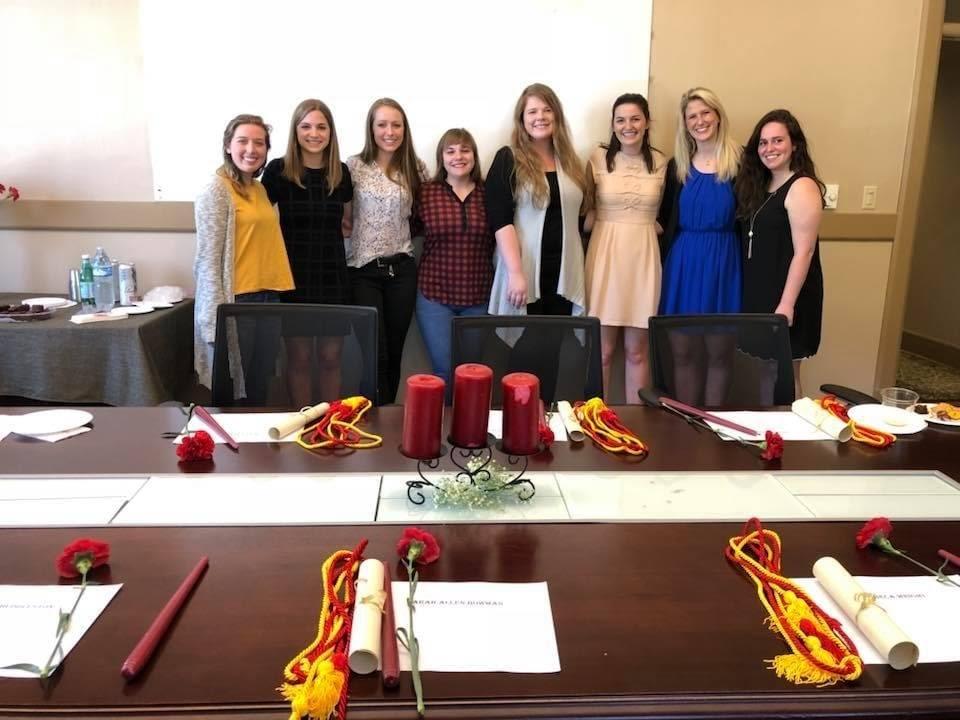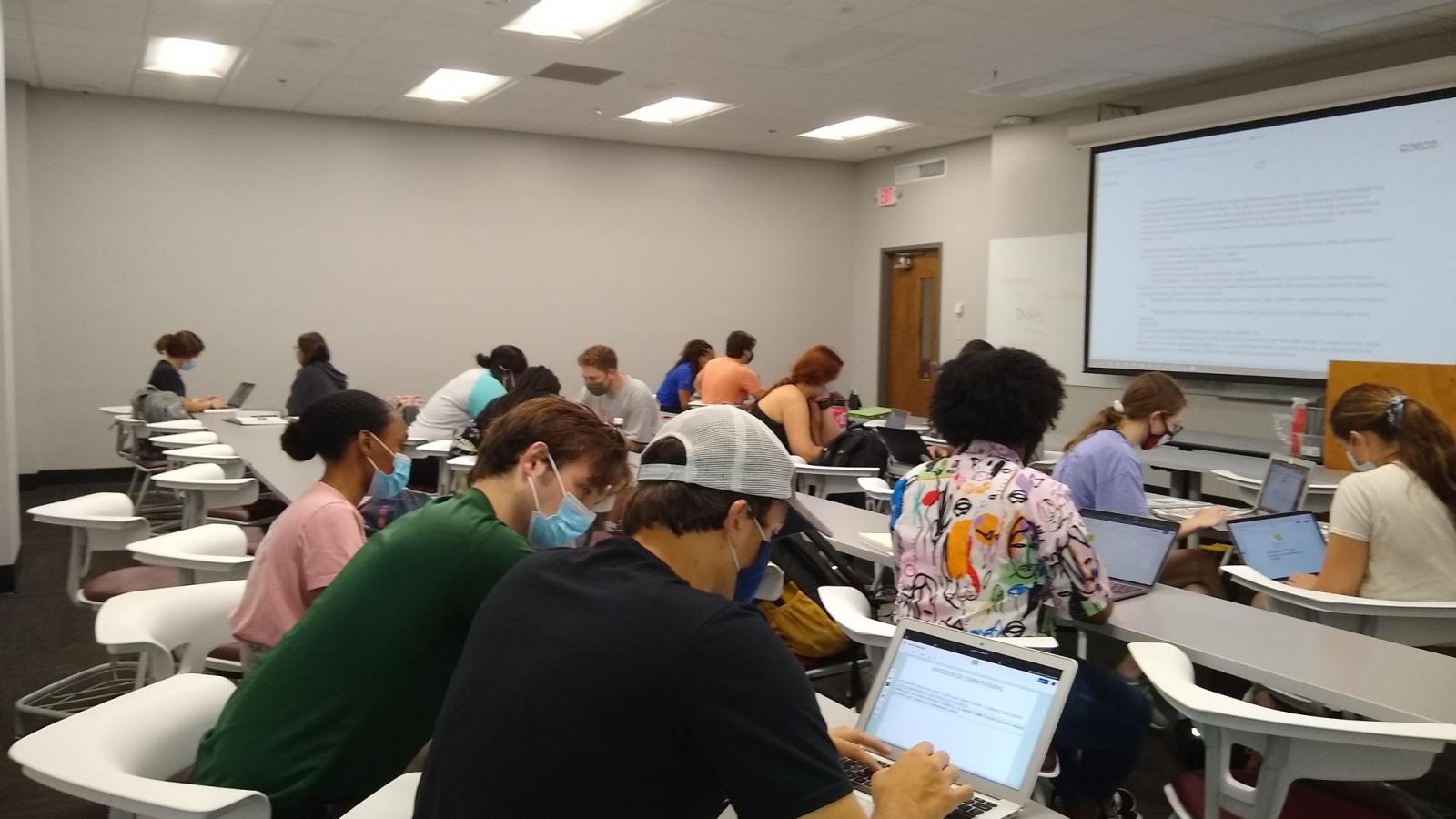Spanish
WELCOME TO SPANISH!
The Spanish section is dedicated to the study of languages, literatures, and cultures of Latin America and the Iberian Peninsula. We offer a wide variety of undergraduate courses including basic Spanish language instruction and upper-level courses in literature, culture, film, linguistics, and pedagogy. Undergraduate students may pursue a major or minor in Spanish.
The major in Spanish requires 123 credit hours. In addition, students can choose to earn a minor in Spanish/Foreign Language. We also offer a 5 year dual degree in International Business with a concentration in Spanish. It requires 154 credit hours. Students can combine a career in Business (marketing or finances) with an insightful cultural knowledge and language proficiency in Spanish. For more information, click here and contact Amie Russell
Graduate students can pursue an MA in Foreign Languages (Spanish); for more information please contact, Dr. Kelly Moser.
WHY STUDY SPANISH?

Because it is more useful than you may think, and more enjoyable than you ever realized. It is the key to knowing your neighbors. In whatever field, Spanish is a great tool to get ahead, and a skill which enriches the rest of your life.
- Culture. The Spanish speaking world has produced some of the world’s most significant writing, from the Renaissance to the present, and acclaimed films ever since films started to be made.
- International trade: Mexico alone is the US’s biggest trading partner; trade with Latin America is huge. And not just the Americas: Spain has the world’s 13th biggest economy; Africa has the oil producer Equatorial Guinea; Spanish is widely spoken in Morocco.
- US domestic commerce: many US regions require a knowledge of Spanish to get ahead, especially in the Southwest and Florida. However, Spanish-speakers work throughout the US. Entire industries in the US depend on Hispanics, from agriculture to construction. And Hispanics need healthcare even if they cannot speak English.
- Many of the US’s most highly qualified immigrants and citizens are Hispanic, as are many of the planet’s most highly qualified people (and their associated industries and business).
How to spot a student of Spanish who has read books and watched movies: their language is good. We in the Spanish section can take you to the next level. It’s also fun. We offer study abroad programs in Spain and Central America to immerse you in the language; we encourage you to spend as long as possible in Spanish-speaking environments.
WHAT SPANISH CAN DO FOR YOU
- Those books, movies or Study Abroad when added up can link you to the above by enabling you to understand people. You will not build solid relationships if you do not learn their language and culture. English alone is not enough.
- Of course your teachers at MSU love Spanish literature and film. That is why we teach them. But Spanish is more than a line on a résumé. It is part of a living, breathing culture which will connect you to your fellow human beings in ways you do not even know yet.
- A minor in Spanish is not just 18 hours of credit; it is the key to a world you never realized existed. An International Business degree at MSU is actually two degrees, one in Language, one in Business. Our Language Major and Masters level degrees are stepping stones to good jobs and friendships.
- A Spanish major is good for any profession you want to follow. Some particular relevant jobs for which language and culture are crucial are in the government (Dept. of Justice, Immigration & Naturalization, the CIA, the Defense Dept, embassies), the Peace Corps, international political organizations, multinational business, human resources, health care services, (doctors, nurses, Doctors without Borders), the Hospitality Industry (hotels, restaurants, cruises), agriculture, poultry industry, the transportation industry (airlines, trains), non profits, and in any area where you might be in contact with Hispanic/Latinx population or just a globalized culture.
- Studying Spanish language and culture is traditionally seen as an “arts” course. It is, but studied well it opens doors everywhere. And not merely in the job market. It enriches every aspect of your life. We in CMLL will help you master it. That is our job. The rest is up to you.

Two useful links:
- On the Hispanic world in general, from jobs and economy to culture:
https://www.leadwithlanguages.org/lwl-language/spanish/ - On US trade:
https://www.cepal.org/en/publications/44993-united-states-latin-america-and-caribbean-trade-developments-2019
DEGREE REQUIREMENTS
Spanish Major: 123 total degree hours consisting of 38 FLS credit hours, in addition to College of Arts & Sciences and University requirements.
International Business Dual Degree - Spanish Concentration: 154 credit hours. For more information click here.

Spanish Club: Come and have fun with the Spanish Club. There you can join other students who are interested in Spanish. The goal is to have fun and learn more about the culture and the language. All levels of Spanish-speakers are welcome from beginners to advance. The members of the club organize movie nights, games, tertulias, guest speakers and other activities. For more information contact: Julia Kraker.
Honors Society: If you love Spanish and you embrace excellence, consider joining Sigma Delta Pi, the largest Honors Hispanic Society in the word. MSU’s chapter has been around since 1962 and inducts the best of our Spanish students. For more information contact Dr. Rosa Vozzo.
STUDY ABROAD OPPORTUNITIES
Experience the culture and refine your language skills through our Study Abroad Programs. Enjoy immersing yourself in the culture of Spain or Central America. Every summer, many students participate in either our Spanish Language and Culture in Spain Program or our more advanced program Central American Literature and Culture. Being in contact with other culture is a life-changing experience. For more information contact Chris Little.
OPPORTUNITIES FOR GRADUATE STUDENTS
- We offer funding for teaching assistants in the form of 100% tuition remission benefits and a monthly stipend.
- Graduate students are mentored by a highly-qualified language coordinator.
- During their second year of study, graduate students are often given the opportunity to serve as the instructor of record for basic language courses, which puts them at the helm of their own sections of undergraduate students.
- Graduate students often serve as assistants for summer study abroad program.
- We have a proven track record of placing our students into excellent doctoral programs at many institutions across the United States including Duke University, the University of Wisconsin, the University of Minnesota, Louisiana State University, the University of Georgia, the University of Tennessee, and the University of Alabama. Other students are teaching at K-12 level, or at college level as lectures and instructors. Others are working in education and business at an administrative level.
- We collaborate with the Department of Curriculum, Instruction, and Special Education for those students interested in becoming a licensed K-12 World Language Teacher. Contact Dr. Kelly Moser for more information.
COURSES
UNDERGRADUATE COURSES
Basic Language Program
The Basic Language Program in Spanish at Mississippi State University includes:
FLS 1113: Spanish I,
FLS 1123: Spanish II,
FLS 2133: Spanish III, and
FLS 2143: Spanish IV.
The objective of these courses is to develop students’ Spanish language proficiency in order for them to interact respectfully within and across cultures. The program is framed around the three modes of communication as outlined by the American Council on the Teaching of Foreign Languages (ACTFL):
- The interpersonal mode focuses on spoken or written conversations in which learners negotiate meaning to share information with one another.
- The interpretive mode requires learners to understand, interpret, and analyze what is heard, read, or viewed.
- The presentational mode includes opportunities for learners to present information, concepts, and ideas through speaking and writing to inform, explain, persuade, and narrate on a variety of topics.
The basic language curriculum is based upon the five goal areas of the ACTFL World-Readiness Standards for Learning Languages: Communication, Cultures, Connections, Comparisons, and Communities.
The program is proficiency-based, with the expectation that learners will progress throughout the program of study toward Advanced-Low (see ACTFL Proficiency Guidelines) prior to graduation.
Methodology and Pedagogy
Each class from the very first day of study immerses learners in the Spanish language and its various cultures. Learners use new vocabulary and structures to demonstrate their growing language skills through a variety of performance-based tasks that integrate the three modes of communication. These tasks merge language and cultures by relying on authentic documents and real-world experiences. For example, Spanish I and II learners might view a subway map (interpretive mode) to give directions around Madrid (interpersonal mode). They could call a lost Uber driver telling him how to arrive to their home (interpersonal mode). Students might listen to airport announcements (interpretive mode) and make suggestions to a family member to prepare her for travel changes (interpersonal mode), or read about college students’ health and wellness habits (interpretive) and persuade the university to create a wellness campaign (presentational mode). Tasks build in complexity to prepare learners to communicate about more complex, formal topics.

Successful learners of Spanish must be active by interacting with each other, the teacher, and the language. They must also remember that acquiring a language takes time, a willingness to take risks and make mistakes, and a desire to seek opportunities to use and hear language beyond the classroom space.
Upper-Level Spanish Courses
Our upper-level classes are taught in the target language and connect students with authentic examples of Spanish culture. We offer a broad range of courses that cover composition, conversation, business, culture, film, art, literature, and linguistics. We teach the Hispanic world, integrating its native traditions and racial, ethnic, and linguistic diversity and studying its main traditions but also its margins. Our faculty have expertise on the culture of Mexico, Central America and the Caribbean, Spain, Southern Cone (Argentina, Chile and Uruguay), linguistics and indigenous languages of the Americas, and Language Pedagogy.
- The transition from language classes to upper level is done through composition (FLS 3113) and conversation (FLS 3233), where students debate and write papers to develop a more formal use of the language.
- In Hispanic Civilization (FLS 3143), students learn about the social, ethnic, racial, and historical issues that have shaped the culture of Spain and Latin America. For example, they might discuss the paintings of Picasso and their connection with the Spanish Civil War. In our business Spanish classes (FLS 3313, FLS 3323), students study business language and the different Latin American globalized economies.
- Students can enjoy classes on film (FLS 4293, FLS 4213), discussing the works of Buñel, Almodóvar, and Del Toro among others.
- In our upper level classes (FLS 3623, FLS 4223, FLS 4263, FLS 4283, FLS 4453, FLS 4543, FLS 4713, FLS 4843, FLS 4853, FLS 4883 among others), students can discover the richness of Spain and Latin America, their myths, history, literary traditions, cultures through reading (short stories, novels, poems, graphic novels, journalist work, testimonio, hybrid texts), hearing music, discussing visual art, photography, and other forms of art, and understanding social movements and historical processes. For example, in FLS 4213, Spanish Women Writers, students read writers who challenge the patriarchal Hispanic tradition, its heteronormative role genders, and even its biological definitions of womanhood.
- The department also offers Special topic classes (FLS 4990); for example, The Modern Hispanic Detective Novel; 21st Century Latin Am. Culture & Literature: Violence and Imagination; and Spanish for Heritage Speakers, among others.
- Students can now take linguistics courses in Spanish. In courses such as Spanish Phonology (FLS 4643) and Introduction to Spanish Linguistics (FLS 4633), students will begin to think like linguists and will never look at human language—or Spanish—the same way again! There they will explore questions such as: Why are Spanish verbs so complicated? How can you learn to roll your r’s? Why are there so many dialects in Spanish? What can be done to sound like a native speaker?
For a list of our most current classes check here.
GRADUATE COURSES IN SPANISH
Our graduate classes are small allowing for in depth discussion and personalized instruction. Graduate students take a combination of split level classes (FLS4000/6000, see above for more information), graduate classes (FLS8000) and classes on pedagogy, literary theory (FL8000), and linguistics. Students can study art, film, literature, culture, myth, history of Latin America and contemporary Spain. These topics are supported by history, critical theory, gender studies, cultural studies, and film studies among other approaches. For example, in FLS 8283: The Contemporary Spanish-American Novel and Short Story, the students might explore how romance and affect work in literary and other art representations or in other semesters explore Latinx literary production of the 20th century. We also offer Special topic classes, such as Disobedient Bodies; The Carnivalesque; and Modern Novel of the 19th Century among others. We have also recently added new classes on Spanish Linguistics, in which students study the tools and approaches of contemporary linguistics analysis, including phonetics/phonology, morphosyntax, and semantics/pragmatics. Emphasis is placed on linguistic variation, how Spanish has been affected by other languages and the ways in which human language generally is socioculturally understood and shaped.
For a list of current classes, see here.
LANGUAGE PLACEMENT
Students are able to earn credit for Spanish at Mississippi State University in several ways; further information is available at this link.